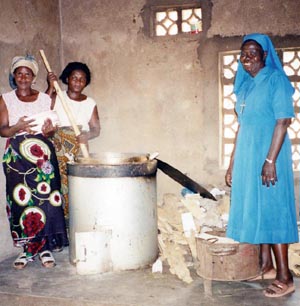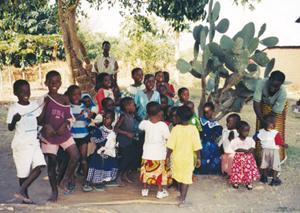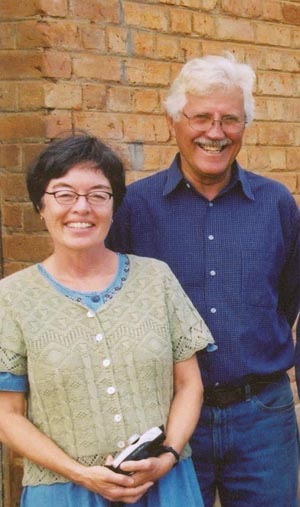LIVING WITH HOPE
Sr. Beatrice Chipeta rekindles the hope of the people of northern Malawi, as they work together to bring new life to their communities
By Beverley Vantomme
March 2005
Return to Table of Contents
Print Article
It is a profound experience of Eucharist to be among people who care deeply for others, who love those who are abandoned and on the fringes of the community. My husband Ray and I, along with our Scarboro mission team, witnessed this experience of sharing and love in Karonga, Northern Malawi - a region ravished by HIV/AIDS, drought and hunger - This remote and sparsely populated area near the Tanzanian border is often overlooked by government agencies.
In an effort to respond to the many malnourished and orphaned children, Rosarian Sister Beatrice Chipeta started the Lusubiro Community-Based Orphan Care Project here in 1997. Lusubiro, a word meaning "hope", speaks volumes about the project, which today feeds approximately 10,000 children, many of whom are malnourished and HIV positive.

Sister Beatrice Chipeta at the Nutrition Centre with volunteer cooks using an environmentally friendly stove. The Nutrition Centre and nursery school are two of many programs of the Lusubiro Project, all supported by volunteers from the communities and villages of Karonga, Malawi.

Children and their teacher at the nursery school in Karonga, a program of the Lusubiro Community-Based Orphan Care Project.

Scarboro missioners Beverley and Ray Vantomme.
The United Nations estimates that 14 percent of Malawi's 12 million population are living with HIV/AIDS, and as many as two million children are orphaned by AIDS.
"There is a poor survival rate, but our efforts must continue," says Sr. Beatrice. Each day more children come to the Lusubiro project feeding centres located in 32 villages. The centres offer food daily, weekly or bi-weekly, depending on the availability of funds.
"The purpose of these centres is not only to offer food, but also to give parental love to these children," says Sr. Beatrice. Her associate is presently finishing a one-year course in counseling so that he can offer emotional and psychological support as well.
Through her dedicated service and love, Sr. Beatrice has given the people hope where there was only despair. Many villages now have committees responsible for small gardens where they grow a variety of crops. Some of the yield is sold and some is used to feed the orphans and needy people in times of famine. The committees also raise goats, cows and pigs, which are sold and the money used to buy soap, clothes, schoolbooks and other necessities for the children. Some of the funds are used to provide fishing nets to villages along the shore of Lake Malawi where fishing is a means of livelihood.
A group of local women also devote themselves to this ministry to those in their communities: to orphans and other needy children, to AIDS patients receiving home-based care, and to the aged. The women find ways of gathering funds for this work. And, if the communities have anything to contribute or share, they do.
Sr. Beatrice has also opened two rural centres offering programs to raise HIV/AIDS awareness and to teach women about this pandemic disease. The women also learn about nutrition, childcare and other health issues.
The Nutrition Centre in Karonga was the first initiative of the Lusubiro project begun in 1997. Today, volunteer women continue the work, cooking food in a little room using three small environmentally-friendly wood stoves that require much less wood for cooking. The women usually feed the children a fortified porridge called likuni phala. There is a small garden for growing vegetables, and a chicken room tended by a young orphaned boy. The chickens are used to feed the frail and sick children.
At one time, Sr. Beatrice bought four gaunt cows that one of the older boys who is HIV positive began taking to pasture to feed. Today the Nutrition Centre relies on these cows for milk to feed infants whose mothers have died during childbirth.
The Nutrition Centre also has a nursery whose building and land were donated by a local businessman. A teacher volunteers her time, giving loving attention to the little ones in her care. To help the community to see HIV-positive children as no different and not to be kept apart, the nursery also welcomes other children from the surrounding area.
Sr. Beatrice is also concerned for widows or women who have been sent away by their husbands. She has organized a very humble home for them to live in, which also has an adjoining room to raise chickens for income generating purposes. The women in turn help in the work for orphaned children.
The Lusubiro project also provides older children with the opportunity to attend secondary school (primary school is free in Malawi). Sr. Beatrice may either pay their school fees with donated money, or assist the villages to raise the money themselves.
Also taking part in this project of hope are the Marionist Brothers at the Miracle Technical School. They offer skills training to older orphans and other vulnerable young people to assist them to be self-reliant and self-supporting.
On the day we visited the Nutrition Centre and nursery in Karonga, the children prepared a program of singing and dancing that brought tears to our eyes. Some were very frail but joyfully sang and danced with their friends.
That day, Sr. Beatrice shared with us the story of one of the children who became a special person in her life. This young boy was physically handicapped and HIV positive. People would often ask her why she fed him, clothed him and gave him medication when he was going to die anyway. She replied, "He is a child of God and deserves to live with dignity."
When the child died Sr. Beatrice bought him a beautiful coffin to honour his life. She smiled with tears in her eyes as she showed us a picture of the child whom she loved. "For I was hungry and you gave me food...I was sick and you took care of me" (Matthew 25:35-36). These words came to life for Scarboro missioners the day we visited the Lusubiro Project in Karonga. May Sr. Beatrice and all those who accompany her be blessed with continued energy, health and hope.
The Rosarian Sisters from Northern Malawi serve in the Diocese of Mzuzu. They have welcomed Scarboro missioners to Malawi, inviting us to walk with them in friendship and ministry. They were founded by a French Canadian Missionary of Africa and received their formation with the Missionary Sisters of the Immaculate Conception (a French Canadian Order). Today there are 68 Rosarian Sisters with ministries in health care, education, HIV/AIDS awareness, human development focusing on women and children, and pastoral care.
"It is important to recall that there are today, now, at this very moment, six million people dying of AIDS, four million, one hundred thousand of them in Africa. I don't begrudge a penny to South-East Asia. But what does it say about the world that we can tolerate the slow and unnecessary death of millions, whose lives would be rescued with treatment?
...It took but days for the Paris Club to espouse a debt moratorium for all of the countries affected by the tsunami, but time and time again - most recently just last fall - the G8 refuses to cancel African debts."
Stephen Lewis, UN Secretary-General's Special Envoy for HIV/AIDS in Africa, January 18, 2005, on his recent trips to Malawi and Tanzania.
Return to Table of Contents
Print Article